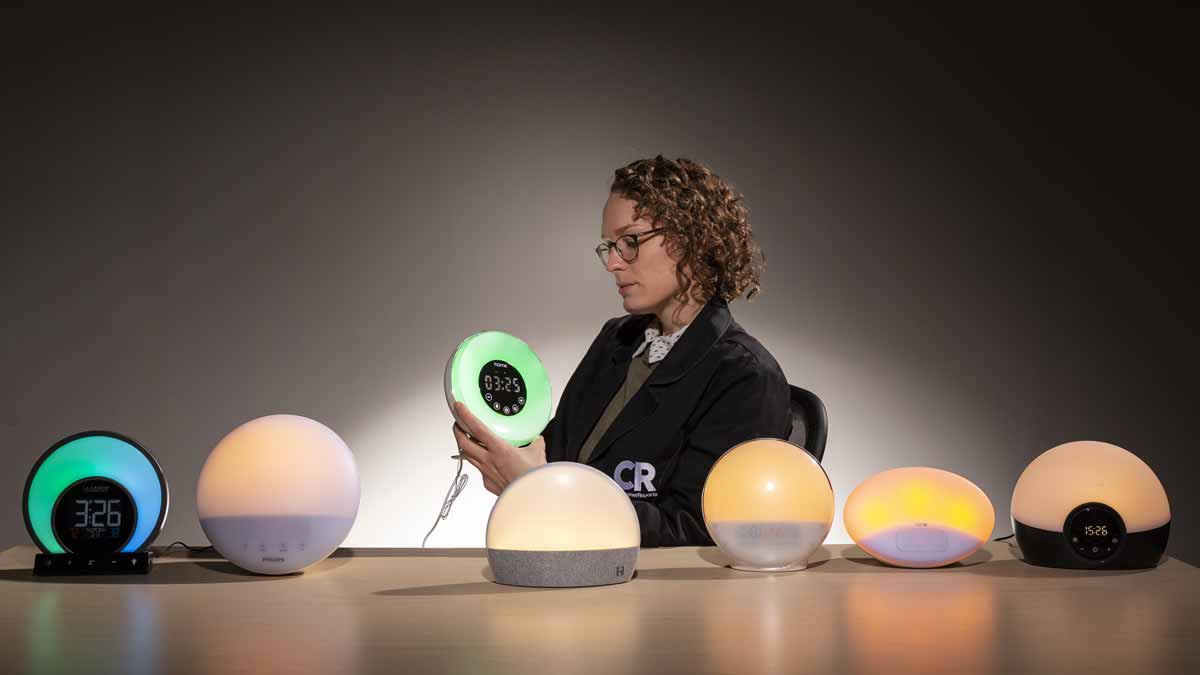With this in mind, a growing number of brands are selling sunrise alarm clocks, and we set up a test to explore whether a selection of popular models are worth your money—including the Philips SmartSleep Wake-Up Light, the Lumie Bodyclock Glow 150, the JALL Wake Up Light, and more.
Sometimes called wake-up lights, these devices gradually brighten over the course of a designated window of time (typically 10 minutes to two hours), before reaching its highest level of brightness at your desired wake-up time. Some higher-end sunrise alarm clocks emit light with colors resembling a natural dawn, incorporating more nuanced shades of yellow, orange, and red to wake you up.
How bright should sunlight alarm clocks be? Generally speaking, to effectively wake you up, a light should fill your room. While we didn’t measure the brightness of light intensity in this round of testing, we found that a manufacturer’s advertised intensity can vary from clock to clock.
The maximum brightness intensity of two of the devices we tested landed around the 300-lux range (measured from a distance that roughly approximates what’s between a sleeper’s eyes and the nightstand where the clock would presumably sit). The cheaper clock options fell below that. One clock in this round of testing emits 500 lux from about a foot away, according to the manufacturer. Another provided no information, even when we reached out to customer service.
Waking up with light, albeit artificial light, isn’t just helpful for people seeking a more pleasant way to start the day—it’s also great for those struggling with time changes like a transition from daylight savings to standard time, jet lag, or shift work.
“The impact can predispose the body to wake up as if it were receiving direct access to [sun]light,” says Girardin Jean-Louis, PhD, a professor of psychiatry and neurology at the University of Miami who has studied sleep equity for more than 20 years.
Of course, these devices aren’t a replacement for how refreshed you might feel after 7 to 8 hours of quality sleep. But for those who are not morning people, a sunrise alarm clock can be pretty good at helping them wake up more easily. (If you’re a heavy sleeper, make sure to set the clock for a wake-up sound along with the sunrise alarm.)
As one user told CR, “I have an extremely hard time waking up early for work. I also get seasonal affective disorder in the fall and winter. I noticed how my mood is greatly impacted by the sun and thought a sunrise alarm clock would help. It does.”
There may be some scientific evidence for this. While the effect of light on sleep and waking is still a relatively young field, research suggests that dawn simulation may be helpful. One study found that it may ease subjective feelings of grogginess. Another reported that adolescents experienced enhanced alertness, demonstrating significantly increased attention during computer tests when compared to a baseline.
As the category has continued to evolve, sunrise alarm clocks have also evolved to help you sleep. Some of the best sunrise alarm clocks come with a white noise option or calming nature sounds (ocean waves, rain), breath-work guidance, even an assessment of your room’s temperature, humidity, and noise and light levels. (Most of the models from CR’s tests have at least one of these capabilities.)
Source link
- Polskie kasyna online z turniejami dla graczy.596
- Najlepsze Kasyna Online w Polsce w 2025.10590 (2)
- Gioco Plinko nei casin online in Italia.2170
- – Официальный сайт Pinco Casino.8053 (2)
- Casino Mostbet Azrbaycan.1032
-
- B7 Casino NL — Bonus €450 en 250 gratis spins.2447
- 7Slots Casino – 7Slots Casino giri.30
